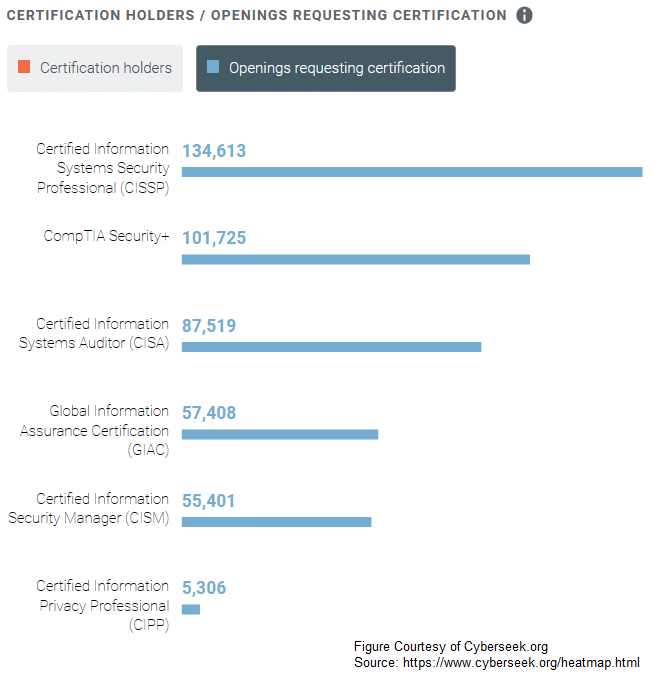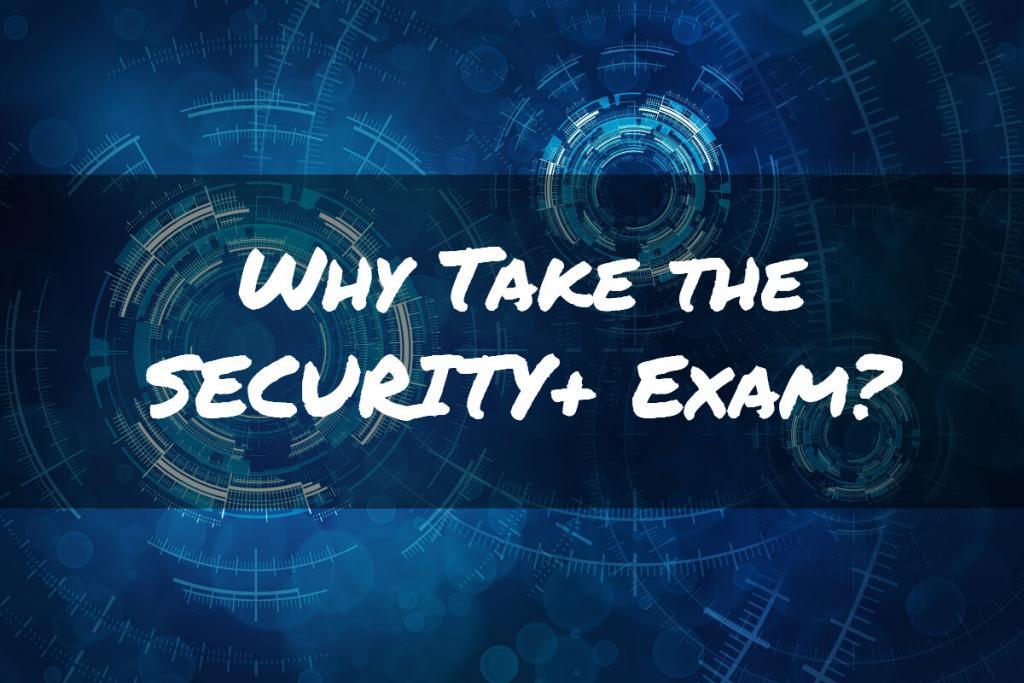The CISA certification opens many doors that require you to be the go-to expert in IT governance, risk management, and compliance.
But are wondering whether the CISA certification is right for your career?
If so, then read on as this article provides comprehensive answers to your CISA related questions.
My Opinion
Is CISA a good certification? Absolutely yes, earning a CISA certification is well worth it.
It’s also a great way to boost your resume and increase your chances of landing a job. This is especially true if you’re interested in pursuing a career in IT auditing or security auditing.
Becoming a CISA Auditor can open up career opportunities for you while giving you the distinction of being globally recognized, trusted, and respected in your field. And just to give you an idea of its popularity, the CISA certification is the 3rd most requested security certification in the industry.
However, like any other security certification, passing and renewing the CISA certification requires money, time, and most importantly, effort!

What Is a Certified Information Systems Auditor?
Simply put, CISA is the gold standard for anyone looking to specialize in auditing the security of information systems. That’s why having a CISA certification doesn’t just look impressive on your resume, it equips you with the knowledge to safeguard an organization’s most valuable asset: its data.
CISA is a professional designation granted by ISACA (Information Systems Audit and Control Association) to individuals who demonstrate expertise in auditing, control, and security of information systems.
CISA professionals often work in roles related to IT audit, risk management, and compliance, helping organizations identify vulnerabilities, improve processes, and ensure compliance with regulations.
Background of ISACA as the Certifying Body
Founded in 1969, ISACA supports IT professionals with resources, training, and certifications in IT audit, control, and governance. Recognizing the need for standardized IT security practices, they developed CISA in 1978.
Since then, ISACA has become a global leader in IT certifications, focusing on skills in cybersecurity, audit, and IT risk management.
By earning a certification from ISACA, you join a worldwide community of IT professionals dedicated to high standards in security and governance. ISACA is respected for its rigorous training and certification process, which is why employers trust ISACA-certified professionals.
And one of the best things about CISA? It’s recognized in over 180 countries, making it a great asset whether you’re staying local or exploring international opportunities.
Importance of CISA Certification
CISA gives you the knowledge to:
- Identify risks in a company’s IT systems.
- Ensure compliance with industry standards and regulations.
- Protect valuable information from cyber threats and breaches.
If you’re aiming to make an impact, CISA certification prepares you to be a valuable asset in any business environment where security and reliability are critical.
Key Industries and Sectors that Require CISA Certification
CISA certification is versatile, and its relevance spans across several major industries. If you’re certified, you’ll find your skills are in demand in sectors such as:
- Finance and Banking: Banks rely heavily on IT auditors and compliance managers to secure data and meet regulatory standards. This sector offers solid career growth and high earning potential.
- Healthcare: With patient data privacy being so critical, healthcare organizations seek CISA-certified professionals for IT auditing and security roles. It’s a field where demand is growing fast.
- Government: Federal and local governments need IT auditors and security specialists to protect public data, making it a secure field with strong growth prospects.
- Technology and Consulting: If you’re into fast-paced environments, tech and consulting firms are always on the lookout for CISA-certified pros to help clients improve their security and governance practices.
No matter the industry, CISA-certified professionals help organizations prevent costly security breaches and keep operations running smoothly.
CISA Certification Benefits
So, let’s talk about the benefits for you personally:
- Staying Relevant: The CISA renewal process encourages you to keep learning, which helps you stay competitive and informed on the latest in IT audit and security.
- Network Growth: By staying active in ISACA and maintaining your certification, you’re also staying connected to the CISA community, which is great for professional growth and networking.
- Membership Perks: If you’re an ISACA member, you get access to more resources and discounts. It’s worth considering if you plan to stay in the field long-term.
- Credibility: CISA is globally recognized, so when you add it to your resume, you’re showing your colleagues that you’ve met an industry gold standard.
- Career Advancement: If you’re looking to take on leadership roles in IT audit or cybersecurity, this certification shows you’re serious and have the know-how.
- Job Security: Companies are always looking to secure their information, so demand for skilled professionals isn’t going anywhere. CISA gives you a competitive edge and makes you a valuable asset in today’s job market.
- Salary Boost: CISA certified individuals also benefit from the increased earnings associated with possessing this certification.
Benefits of CISA Certification for Organizations
So, what’s in it for companies when they bring in CISA-certified professionals?
Organizations benefit big time from having CISA certified team members, especially in managing risk and security. Here’s why companies value CISA and how it can make a real difference in their operations:
Enhanced Security and Risk Management
With a CISA-certified pro on board, companies can trust their IT environments are secure and that risks are managed proactively. CISAs bring expertise in identifying vulnerabilities and implementing solutions before issues become costly problems.
Compliance and Reduced Penalties
Compliance isn’t just a box to tick, it’s essential to avoid fines and legal issues. CISAs are trained to ensure that systems and practices align with industry regulations, which keeps the organization in good standing and reduces the risk of penalties.
Efficient IT Auditing Processes
When audits are done smoothly and effectively, it saves time and resources. CISA certified professionals know how to streamline audit processes, ensuring operations remain compliant without unnecessary interruptions.
Strategic IT Alignment
CISA certified professionals don’t just focus on security; they align IT strategies with the organization’s goals. This means that IT isn’t just a background operation but a powerful asset supporting the company’s growth and success.
With CISA certified professionals, companies get peace of mind that their IT systems are secure, compliant, and in line with business goals. It’s a win-win for everyone.
CISA Certification Salary
CISA Certification is among some of the most high-paying IT certifications.
Earning the certification can help you secure high-paying jobs such as:
- Internal Auditor
- Public Accounting Auditor
- Information Systems Analyst
- IT Audit Manager
- Project Manager
- IT Security Officer
- Security Auditor
The average CISA salary can depend on several factors, such as experience, job title, location, employer size, and the responsibilities of the position.
According to Payscale, the annual base salary of a senior IT Auditor ranges between $70,000 and $112,000. For Compliance Managers or Risk Management Specialists, your salary may range from $95,000 to $130,000 and can go even higher in some industries.
CISA Certification Requirements
Who’s eligible to go after the CISA certification?
While CISA is open to a range of IT professionals, it’s especially suited for those already involved in auditing, control, or security.
CISA is designed for professionals with real-world experience.
You’ll need at least five years of professional experience in information systems auditing, control, or security.
The good news…if you’ve already been working in the field, you may be able to meet this requirement through your current or past roles.
If you don’t have the full five years, don’t worry. ISACA offers a few substitutions, like getting waivers for certain educational degrees or certifications related to information technology.
A maximum of 3 years of experience may be waived if the applicant has a master’s degree in IS or IT.
Who Should Take the CISA Certification Exam?
If you’re already an IT auditor working in the field, CISA is practically tailored for you to enhance your career. It validates your expertise and takes your credentials up a notch.
As for everyone else…
- Compliance and Risk Managers: CISA covers governance and compliance topics, so if you’re in compliance or risk management, this certification can add a lot of value to your skillset.
- Recent Graduates: If you’re fresh out of college in a related field like IT, cybersecurity, or information systems, CISA is still a good option. While you may need a bit more experience, you can start preparing now and work toward the certification as you gain experience.
Core Domains Covered in the CISA Certification
The CISA certification covers several key domains that are essential to effective IT audit and security practices. These include:
Domain 1 – Information System Auditing Process (18%)
So, the first domain is all about understanding the Information System Auditing Process. This is the foundation because, as an IT auditor, your main job is to assess systems for weaknesses, ensure they meet standards, and keep them secure.
In this part, you’ll learn how to:
- Plan and conduct audits effectively, so you can catch vulnerabilities early.
- Evaluate controls and compliance to ensure systems follow regulatory guidelines.
Getting the hang of this process is crucial. It’s like being a detective for IT systems—finding issues before they turn into big problems and recommending ways to fix them.
Domain 2 – Governance and Management of IT (18%)
Next up, we have Governance and Management of IT. Now, this might sound fancy, but it’s really about making sure that a company’s IT is supporting its bigger goals. You’ll be diving into how IT aligns with organizational objectives, so everyone—from the IT team to executives—is on the same page.
In this domain, you’ll learn how to:
- Evaluate IT governance structures, ensuring they support business needs.
- Assess risk management practices to help businesses minimize exposure to threats.
- Ensure IT policies and procedures are both effective and in line with organizational goals.
In other words, you’re making sure the company isn’t just “doing IT” for the sake of it, but rather using it strategically to move the business forward.
Domain 3 – Information Systems Acquisition, Development, and Implementation (12%)
Moving on, this domain is all about Information Systems Acquisition, Development, and Implementation. When a company needs new software, for example, there’s a lot that goes into making sure it’s developed or acquired securely and efficiently.
Here’s what you’ll learn in this part:
- Evaluate project management practices to ensure new systems are implemented on time and within budget, adhering to information systems auditing standards.
- Assess system development processes to catch security and efficiency issues early.
- Ensure vendor management is up to par, so third-party vendors meet the company’s security standards.
Think of it like being an inspector for all the new tech coming into a company. You’re there to ensure it’s reliable, secure, and won’t cause problems down the road.
Domain 4 – Information Systems Operations and Business Resilience (26%)
Now let’s talk about Information Systems Operations and Business Resilience. This domain is about making sure everything keeps running smoothly, even when things go wrong. It’s like having a backup plan for the backup plan!
In this domain, you’ll focus on:
- Evaluating daily IT operations to ensure they’re effective and efficient.
- Assessing backup and recovery processes to help maintain continuity in case of a failure.
- Ensuring business resilience by preparing for disruptions like cyber-attacks or natural disasters.
The goal is to keep the business running no matter what. Whether it’s routine maintenance or responding to an unexpected issue, you’re helping the organization stay resilient.
Domain 5 – Protection of Information Assets (26%)
Finally, there’s Protection of Information Assets—probably the most recognizable part of IT security. This domain is all about strategies for protecting data from unauthorized access, breaches, and cyber-attacks.
Here, you’ll learn to:
- Evaluate security policies and controls to ensure data stays safe and secure.
- Implement data protection practices, from encryption to access control.
- Conduct regular risk assessments to stay ahead of evolving threats.
At the end of the day, this domain is about being proactive in securing the company’s data. You’re putting up strong defenses and making sure sensitive information stays protected.
CISA Certification Exam Structure and Content
Let’s get into what you can expect from the CISA exam—knowing the format, types of questions, and how the content is weighted can really help you prepare!
How Many Questions Is the CISA Exam?
Available in eleven languages, the CISA exam is a multiple-choice format, with 150 questions focusing on real-world scenarios you’d encounter in IT auditing and security.
Each question has four answer options, so there’s no guessing penalty—answer every question! The exam is all multiple-choice,
How Long Is the CISA Certification Exam?
You’ll have four hours to complete the exam, which gives you enough time to carefully consider each question. It’s intense but manageable with some practice.
How Is the CISA Certification Exam Taken?
The exam is now computer-based, so you can schedule it online at authorized testing centers or even remotely if that’s an option in your area.
Score Needed to Pass the CISA Exam?
Your score ranges from 200 to 800, with a 450 needed to pass. This score isn’t a simple percentage but a scaled score, meaning each question’s difficulty level is factored in to ensure fairness.
Since it’s multiple-choice, there’s no partial credit for close answers. Every correct answer counts equally, so it’s all about picking the best option.
CISA Certification Cost
The CISA exam cost $575 for ISACA members and $760 for everyone else; this doesn’t include the $50 application fee.
Unfortunately, there are also ongoing maintenance associated with a CISA certification.
CISA Renewal
Once you’ve got your CISA certification, it doesn’t end there; ISACA requires you to keep your knowledge and skills up-to-date. Here’s what maintaining your CISA looks like and why it’s pretty manageable with a little planning!
CPE Activities
To keep your CISA active, you need to earn 20 CPE hours each year and a total of 120 CPE hours over three years. It’s a way of proving that you’re staying current in your field.
ISACA provides plenty of options, so it’s flexible based on your schedule and interests.
You can earn CPEs through various activities like attending conferences, taking online courses, or even presenting at events.
Unfortunately, unless your company is paying for these events, it can get quite expensive. ISACA conferences alone cost a few hundred dollars; while signing up for a training session can set you back several thousand dollars!
So, the best and cheapest way to maintain your CPEs is by attending as many free (or low cost) webinars and training sessions as you can find.
Luckily, ISACA offers up to 72 free CPE hours annually for members.
CISA Renewal Fee
Each year, there’s a maintenance fee (around $45 for ISACA members and $85 for non-members). It’s a small cost, but it keeps your certification active and in good standing.
Documentation and Record Keeping
- Track Your Activities: ISACA expects you to keep records of your CPE activities. It can be as simple as saving certificates or tracking hours in a spreadsheet, but it’s essential for any future audits ISACA might conduct.
- Stay Organized: Keeping up with documentation makes it easy to submit records if ISACA ever requests them. It’s one less thing to worry about when renewal time comes around!
Tips for the CISA Certification Exam
Are you’re ready to prep for the CISA? Let’s talk about how to approach studying, the best materials to use, and a few strategies to keep you on track!
Recommended Study Materials
- CISA Review Manual: This is your go-to guide. It covers each domain in depth and is written by ISACA, so you know it aligns perfectly with what’s on the exam.
- Practice Exams: These are a must! Taking practice tests helps you get used to the question format, timing, and can highlight areas you might need to review more. When preparing for the CISA Exam, you should get a feel for the type of questions the CISA exam asks. I was able to find free CISA practice questions on ITExamable.com. This site contains 30 CISA tests, each with 30 questions, and a 150-question mock test.
- Online Resources and Courses: Look for reputable online courses, video tutorials, or mobile apps that cover CISA material. Many platforms offer CISA prep courses with expert explanations and extra practice questions to help you pass the CISA certification exam.
Study Strategies and Time Management Tips
- Break It Down by Domain: Focus on one domain at a time instead of trying to tackle everything at once. Give more time to the domains with higher exam weight, like Information System Auditing and Protection of Information Assets.
- Set a Study Schedule: Aim to study regularly—30-45 minutes a day is often better than cramming last-minute. Set milestones so you stay on track and cover everything well before exam day.
- Use Active Recall and Practice Questions: Go beyond just reading. Actively test yourself on key concepts and do as many practice questions as possible. This helps reinforce your memory and get used to CISA-style questions.
Join Study Groups or Engaging in Online Forums
- Study Groups: Joining a study group can be a huge help. You’ll gain insights from others, discuss tricky topics, and stay motivated. Sometimes just hearing a concept explained differently can make things click.
- Online Forums: Platforms like Reddit or ISACA’s own forums are full of CISA candidates sharing resources, tips, and encouragement. You can ask questions, share your progress, or even find study buddies!
- Accountability and Support: Study groups and forums keep you accountable, and it’s encouraging to have others going through the same experience. Plus, you can celebrate small wins and keep your motivation high.
CISA Certified Jobs
So, you’ve got your CISA certification, or you’re planning to earn it—what kind of career options does that open up?
With CISA, you’re well-positioned for roles in IT audit, security, and compliance. Here are some of the common titles CISA-certified pros often hold:
- IT Auditor: You’d be responsible for assessing and testing IT systems, identifying risks, and ensuring everything’s in line with regulations. IT auditors are in demand across industries, so this role is quite flexible.
- Information Security Analyst: If you like the idea of protecting data, this role could be a great fit. Security analysts use their CISA knowledge to spot vulnerabilities and develop strategies to secure sensitive information.
- Compliance Manager: In this role, you’d ensure the company follows laws, regulations, and standards, especially in sectors with strict compliance needs like healthcare or finance.
- Risk Management Specialist: Here, you’d assess potential IT risks to help the company avoid financial losses or compliance penalties. You’re basically a critical line of defense for the organization.
Each of these roles offers a unique way to use your CISA skills, so you’ve got options depending on your interests!
Conclusion
In the end, the CISA certification is more than just a credential; it’s a solid investment for both individuals and organizations. For you, it’s a way to validate your skills, open up new career opportunities, and gain recognition in IT auditing and security. For companies, hiring CISA-certified pros means they’re better protected, compliant, and equipped to manage IT risks effectively.
Whether you’re aiming to advance in your current role or step into a specialized IT audit or security position, CISA can be a game-changer. It’s not just about passing an exam; it’s about building a foundation of skills that will keep you in demand and help organizations stay resilient in a digital world. If you’re looking to make a meaningful impact in IT security, CISA is a worthwhile step that pays off both personally and professionally.
FAQs
What Does an Auditor in Information Systems Actually Do?
An auditor in information systems plays a crucial role in ensuring that an organization’s data and systems are secure and compliant. By auditing information systems, these professionals help identify risks, control weaknesses, and compliance gaps, allowing companies to keep their information secure.
What is a Certified Information Systems Auditor (CISA)?
The Certified Information Systems Auditor (CISA) designation, awarded by ISACA, is a highly respected certification that highlights your expertise in information security, IT governance, and risk management. Earning the CISA certification shows employers that you’re skilled in managing and auditing information technology and business systems.
Why is Being CISA Certified So Valuable?
Being CISA certified is like a gold star on your resume if you’re pursuing a career in IT auditing or information security. This certification proves you understand the process of auditing information systems and can apply a risk-based approach to protect and manage critical data. Employers view the CISA designation as a mark of trust and professionalism, opening up roles in compliance, risk management, and IT governance.
What Does the CISA Exam Content Cover?
The CISA exam content focuses on five main domains: auditing information systems, IT governance, acquisition and development of systems, IT service management, and protection of information assets. Candidates must pass a comprehensive exam to prove their expertise across these areas. Preparing well with CISA practice materials and exam prep resources can make a big difference!
What Are the Experience Requirements to Earn the CISA Certification?
To become CISA certified, you need five or more years of professional information systems auditing experience. Your work experience should include roles in information technology and business systems or security work experience in related fields. ISACA may allow some substitutions to meet the requirements, and CISA training courses can help you build the skills needed.
What Does it Take to Become a Certified Information Systems Auditor?
Becoming a certified information systems auditor involves several steps: take the CISA exam, meet the CISA requirements for work experience, and agree to follow ISACA’s code of professional ethics. After you sit for the exam and pass, ISACA will review your experience to confirm you meet all requirements for certification.
How Do I Register for the Official CISA Exam?
To take the CISA exam, you’ll first need to complete exam registration through ISACA’s website. Exam candidates can also access resources like official ISACA CISA materials, which include test prep guides and CISA training courses. During exam registration, you can select an online or in-person test center.
What Types of Jobs Can I Get with a CISA Certification?
With a CISA designation, you’re well-positioned for roles in auditing, compliance, and information security. Job titles include IT auditor, information systems auditor, compliance analyst, and risk assessor. According to the Bureau of Labor Statistics, professionals with CISA certification are in high demand due to their specialized skills.
How Should I Prepare for the CISA Exam?
To be ready for the CISA exam, it’s best to start with a mix of CISA practice tests, exam content review, and exam prep courses. Experts suggest dedicating around 120 hours to CISA training and test prep to ensure you’re fully prepared.



